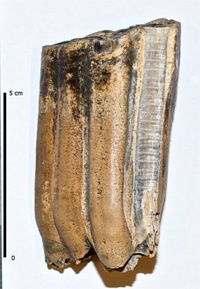- Overview
-

In collaboration with an international research team, I undertook the stable isotope work at the site, including the sequential sampling of enamel biophosphate from horse teeth from throughout the sequence (δ18O) and the sampleing of collagen bones of various herbivore species (δ13C, δ15N).
Now nearing completion, data produced from this project have provided insight into palaeoclimatic and palaeoseasonal conditions at the site, and across the Eemian-Weichselian boundary - a local terrestrial climatic proxy record. Furthermore, the analysis of bone collagen has suggested clear inter-specific differences, notably between the horses and bovids. These trends are likely the result of differences in niche feeding behaviours between these taxa, and reflect the local vegetation zones.
Photo: Kate Britton
- Funding and Project Partners
-
This research was funded by the Max Planck Institute and Deutscher Akademischer Austausch Dienst Junior Research Scholarship to KB (ref: A0970923).
The Neumark-Nord 2 project and excavations were funded by:
- Lausitzer Mitteldeutsche Braunkohlengesellschaft mbH
- Landesamt für Denkmalpflege und Archäologie, Saxony-Anhalt
- Landesmuseum Sachsen-Anhalt
- Römisch-Germanisches Zentralmuseum Mainz
- Leids Universiteits Fonds “Campagne voor Leiden” program
- Netherlands Organization for Scientific Research (N.W.O.)
The isotope research is in collaboration with:
- Thomas Tütken (Rheinische Friedrich-Wilhelms-Universität Bonn)
- Sabine Gaudzinski-Windheuser (Römisch-Germanisches Zentralmuseum)
- Wil Roebroeks (Leiden University)
- Lutz Kindler (Römisch-Germanisches Zentralmuseum)
- Mike Richards (MPI-EVA, UBC)
